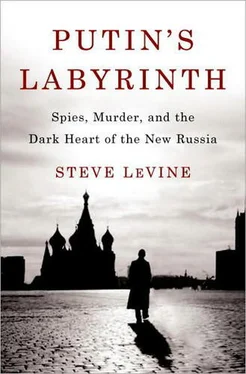I learned later that Kryshtanovskaya turned over her study to friends in a think tank abroad, who paid her and used it under their own byline.
One of the things that foreigners least understand about Russia is why ordinary Russians seem largely unperturbed by the violence and death around them.
Yuri Sinelshchikov, a former deputy Moscow city prosecutor who had dealt with murder his entire professional life, thought it was a matter of practicality or personal priorities. People simply lacked the inclination to care, he said. There was nothing in it for them.
“If people go in the street, they won’t gain materially,” he said. “Any murder can be compared to a show where an actor comes to entertain them. It doesn’t really affect someone unless it happens to them directly. People get angry if they lose a meter of land, or their children are hurt, or someone installs a door that is heavy and could hurt someone.”
The keenest observers on almost any matter in nearly any country are often the bankers, who have much to lose if their judgment is wrong. So I asked a few in Moscow to analyze the Russian mind-set. They were Americans and Europeans who admired Putin’s government and were earning eight-and nine-figure payouts as lawyers, investment bankers, and investors thanks to the Russian juggernaut.
“The local attitude is, ‘Shit happens,’” said Rory MacFarquar, Moscow research director for venerable Goldman Sachs. Slender, baby-faced, and bookish, MacFarquar was persuasive partly because of his long years and deep study of Russia, and also because of his clear and painstaking choice of words. He tended to see things in a historical context. “There is an enormous perception gap about life. It’s not something trivial like ‘life is cheap,’” he said. “Russia has gone through unimaginable tragedies in the twentieth century.”
The United States reacts with great shock to events such as 9/11 and the 1999 Columbine High School massacre because they are so out of the ordinary, he said. But “enormous tragedies” occur with such relative frequency in Russia that its people become almost numb to them.
“One thing the West noticed [after 9/11] is how many people were put in danger. [But] that wasn’t a big thing here,” MacFarquar continued. “The level of routine ecological danger here is enormous. The systematic official lying has led to a universal assumption that the danger is pervasive, which leads to fatalism.”
Al Breach, an executive at United Bank of Switzerland, put it this way: “Life isn’t straightforward here. It’s not significant enough.”
It seemed to me that five or six hundred years of Russian history provided ample reason for its people to become inured to suffering. But two Russian historians told me that my thinking was too simplistic. “I would advise you not to make too much of a continuum of history,” warned Alexei Miller, on a visit home from Budapest, where he was teaching at Central European University. Miller was especially contemptuous of anyone who would mention Putin and Russia’s iconic sixteenth-century czar, Ivan IV—known as Ivan the Terrible—in the same sentence. Alexander Kamenskii, an oft-quoted professor at Russian State University for the Humanities, felt much the same way. “People say that Russians are used to being slaves, are used to dictatorship, and that’s just the way it is. That’s a myth,” Kamenskii said. “Why should we think that people who lived under dictatorship liked it?”
Miller’s and Kamenskii’s admonitions made sense in the abstract—history is not science, and the past doesn’t necessarily dictate the present. But it was hard to understand why in this instance they didn’t see what seemed obvious: that Russians in a sense have chosen to live in the tradition of their medieval ancestors.
It isn’t that Russians favor dictatorship. But they have gone along with autocratic rule even when offered an alternative, as in the parliamentary and presidential elections over eight years that cemented Putin’s grip on power. And there does seem to be a straight line to the present from Ivan the Terrible and the Russian tradition of fear-based rule.
Russia’s first crowned czar and grandson of the creator of the Russian state, Ivan, who took power in 1547, had thinning hair, deep wrinkles on his forehead, and was physically impressive, with a rippling beard and a barrel chest. His more sympathetic biographers thought that he was initially a conscientious and even empathetic leader. Emulating Spain, England, and Portugal in the pursuit of empire, he captured parts of Siberia, fought against Poland for control of the Baltic Sea, and against the Tatars in the east. Ivan opened Russia to the West, welcoming trade with Europe and forming a particularly warm relationship with Elizabeth of England; Elizabeth had a soft spot for Ivan and on at least two occasions offered him asylum should he require it.
Yet, though Westerners were accustomed to savagery against one’s own kind, they were startled at what they witnessed in Ivan’s Russia. An English merchant named Jerome Horsey wrote of a prince named Boris Telupa who, accused of treason, had a stake “thrust into his fundament through his body, which came out at his neck, upon which he languished in horrible pain for fifteen hours.” Telupa’s mother was gang-raped, Horsey wrote, and Ivan “commanded his huntsmen to bring their hungry hounds to eat and devour her flesh and bones, dragged everywhere.” Anthony Jenkinson, England’s envoy to Russia, described the punishment of an unfortunate aristocrat, as Ivan’s men “cut off his nose, his tongue, his ears and his lips.” Ivan had a particular fascination with potions. Convinced that one Prince Vladimir was out to destroy him, he handed a goblet of poisoned wine to the unfortunate man, who died in great agony. His wife and nine-year-old daughter similarly perished after being given the same concoction. When some of Vladimir’s retinue refused to beg for mercy, they were stripped naked, shot, and left for birds and wild animals to eat.
That was how Russians grew up in the sixteenth century. Ivan was out to destroy Russia’s power structure—shared by the Church, wealthy and politically powerful landowners called boyars, and individual princely rivals to the throne—and become its sole, almighty ruler. His enforcers were an ultra-loyalist six-thousand-man band of thugs whom he called the oprichniki. They roamed the countryside on horseback in black robes, a dog’s head and broom etched into their saddles, massacring thousands, including much of the population of the ancient city of Novgorod. To retain their loyalty, Ivan granted them control of the richest part of the country, along with Russia’s principal trade routes.
The consequence of Ivan’s violence was a terrorized, terrified, and cowed population. In a letter to England’s Queen Elizabeth, King Sigismund Augustus II of Poland asked in wonder why Russians, while no doubt fearful of their czar’s savagery, also seemed to defend him as a mark of patriotism.
The most-admired historical figure in Russia is Peter the Great, who two centuries later presided over the torture and execution of hundreds of actual and alleged traitors, including his own son, Alexei. He doled out such punishment “to make an example, to terrify, to force submission,” wrote biographer Robert Massie, but with the ultimate aim of gaining “the power to work his reforms and—for better or worse—to revolutionize Russian society.” He fretted that the pain and death he inflicted might cause his Western friends to think less of him, and ordered that a lengthy letter be delivered to Europe’s heads of state imploring them to ignore reports of his brutality against his son. At the end of the self-serving missive, composed the day after Alexei’s death, Peter advised his European counterparts, “In case also that anyone wished to publish this event in an odious manner, you will have in hand what is necessary to destroy and solidly refute any unjust and unfounded tales.”
Читать дальше












